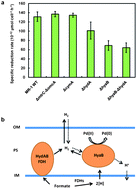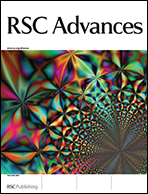Reductive formation of palladium nanoparticles by Shewanella oneidensis: role of outer membrane cytochromes and hydrogenases†
Abstract
Production of catalytic palladium (Pd) nanoparticles using dissimilatory metal-reducing bacteria such as Shewanella oneidensis has a great potential for applications in the treatment of environmental pollutants and in chemical synthesis. The objective of this study was to investigate the role of outer membrane cytochromes and hydrogenases in bioreductive formation of Pd nanoparticles in S. oneidensis. Our results showed that (i) the reduction of tetrachloropalladate (Pd(II)) by Shewanella oneidensis can be well described by a first-order model; (ii) outer membrane c-type cytochromes MtrC/OmcA do not play an essential role in Pd(II) reduction under our tested conditions; (iii) [NiFe]-hydrogenase HyaB facilitates Pd(II) reduction with the presence of lactate or formate as electron donors. Our findings suggest that [NiFe]-hydrogenase HyaB may serve as a potential target for molecular manipulation in S. oneidensis towards an improved performance in reductive formation of Pd nanoparticles.


 Please wait while we load your content...
Please wait while we load your content...